MAVERICK CITIZEN
A call to action: Medical students volunteer to step out of the classroom into the coronavirus pandemic
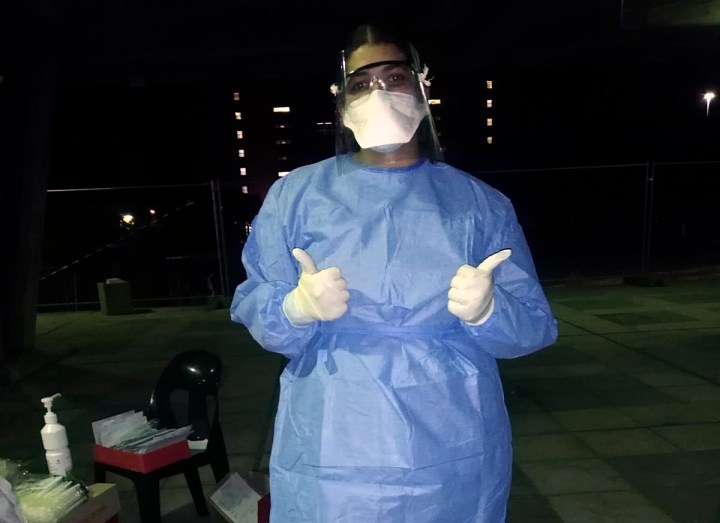
Hundreds of health science students have organised themselves into volunteering groups to assist medical staff at Tygerberg Hospital in Cape Town during the Covid-19 pandemic. From making cloth masks to screening people for the virus, they are putting whatever medical skills and knowledge they have to use. All the while they are adjusting to online learning or the thought of going back into hospitals and clinics. For many, the realities of working as a medical professional have hit home years before they expected it to.
Instead of attending classes to wrap up her fifth year studying medicine at Stellenbosch University, Hannah Abrahams-Crocker has volunteered to assist doctors and nurses to screen and test people for Covid-19 at Tygerberg Hospital in Cape Town. For now, her classes at Stellenbosch University have been suspended. Instead of hunkering down with her family during a global pandemic, they decided together that she would self-isolate in order to volunteer during the outbreak in South Africa – despite being asthmatic herself. The experience has strengthened her resolve to be a doctor.
She is one of hundreds of medical students from different years of study who have organised themselves to volunteer in different ways at Tygerberg Hospital in Cape Town during the Covid-19 outbreak. So far, their role has been mostly non-clinical and voluntary. Many have said that stepping out of the classroom and into the hospital has been a wake-up call – and a call to further action – in one of the country’s epicentres of the outbreak.
The studies of medical students, like all others, were upended by the enforcement of the lockdown. Campuses were closed and residences emptied, sending students scattering across the country in time to lock down safely. Eight weeks later, this uncertainty lingers.
As of 11 May, final-year medical students were allowed to return to campus and hospitals to complete their studies. Minister of Higher Education, Science and Innovation Blade Nzimande has issued a directive which allows for these students to travel back to campus until 31 May and begin their clinical training in hospitals. Other medical students will have to contend with online learning, for now.
Cape Town has proven to be an epicentre within an epicentre. The Western Cape accounts for 13,969 confirmed infections of a national total of 21,343 and 300 deaths out of 407.
Cape Town has 12,248 cases and all of the deaths confirmed to be Covid-19-related in the province.
Tygerberg, the suburb in which the hospital of the same name is situated, has the most cases in the metro. Tygerberg Hospital is the designated Covid-19 hospital for the entire province. The hospital has confirmed that more than 100 staff have contracted the virus already and two nurses have died, according to News24.
Weeks before the numbers started rising, medical students in the city started to figure out how to put their skills and knowledge to work.
We Fight Back Covid began organically. Since before the lockdown, Stellenbosch University students have been assisting Tygerberg hospital at its call centre, screening site and data capture centre. Many wanted to know what they could do from home, explains the co-ordinator of the initiative, Luné Smith. Doctors told students where and when they needed extra hands, and so five loose groups of volunteers started to take shape. Six weeks ago, they decided to join forces to share resources and goals under the banner of We Fight Back Covid.
Now, the project has five initiatives manned by about 200 students. They are mentored by university and hospital staff to make sure their approaches are evidence-based and safe.
The Ward Warriors initiative collects donations for mothers who are locked down in the maternity ward. The mothers can’t get out, and relatives can’t get in, and they were starting to run out of supplies and company. Smith says occupational therapy students have been instrumental in making sure the new mothers get the support and the new clothes, toiletries and snacks they need, as well as their own baby journals.
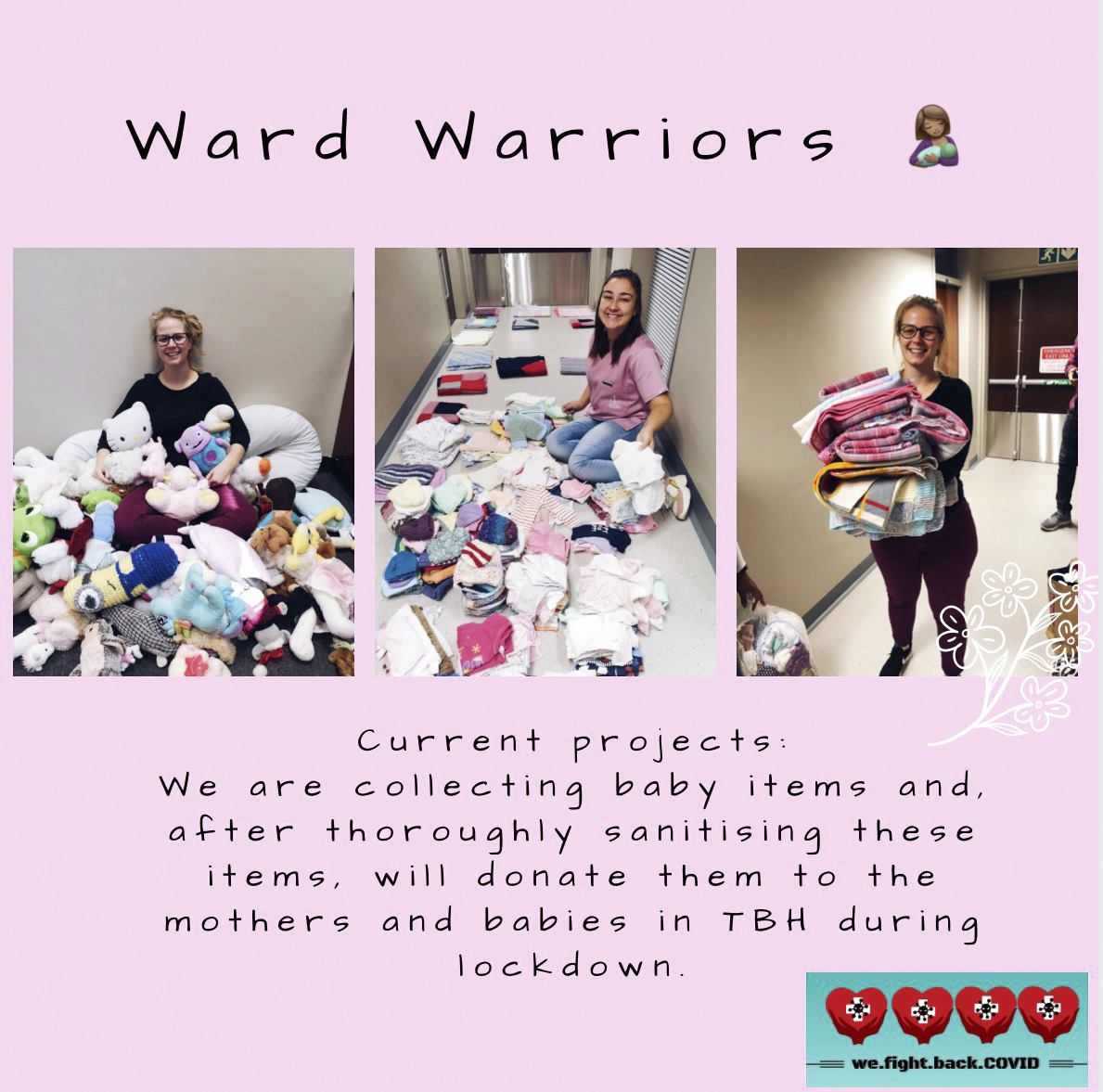
Volunteers for We Fight Back Covid sort through donations at Tygerberg Hospital on 9 April 2020. The donations will be given to mothers who have been locked down in the hospital’s maternity ward. (Photo: Luné Smith)
The students involved in the Victory Visors initiative assist the orthopaedics department to make face shields using their 3D printers.
Those involved in Masking It make masks, and others gather information for the Corona Curriculum campaign, which aims to fight fake news and jargon about the virus online. In addition, students are making spacers out of recycled plastic bottles to ensure that nebulisation doesn’t release potentially dangerous aerosols.
Instagram video embed:
View this post on Instagram
The volunteers are kept away from patients, except for the few permitted to go into the maternity ward, and they do their work in small groups in the administrative buildings or campus classrooms. They are provided with hand sanitiser and facemasks by the initiative and have all the necessary permits to do their volunteer work. The first mask you make is yours to wear.
For now, the project hopes to keep expanding its number of volunteers and projects as hospital staff bring new needs to their attention.
“After the pandemic, we will still have an enthusiastic group of people with a fantastic platform. It might become We Fight Back Malaria or Poverty – it can adapt because it’s dynamic,” says Smith.
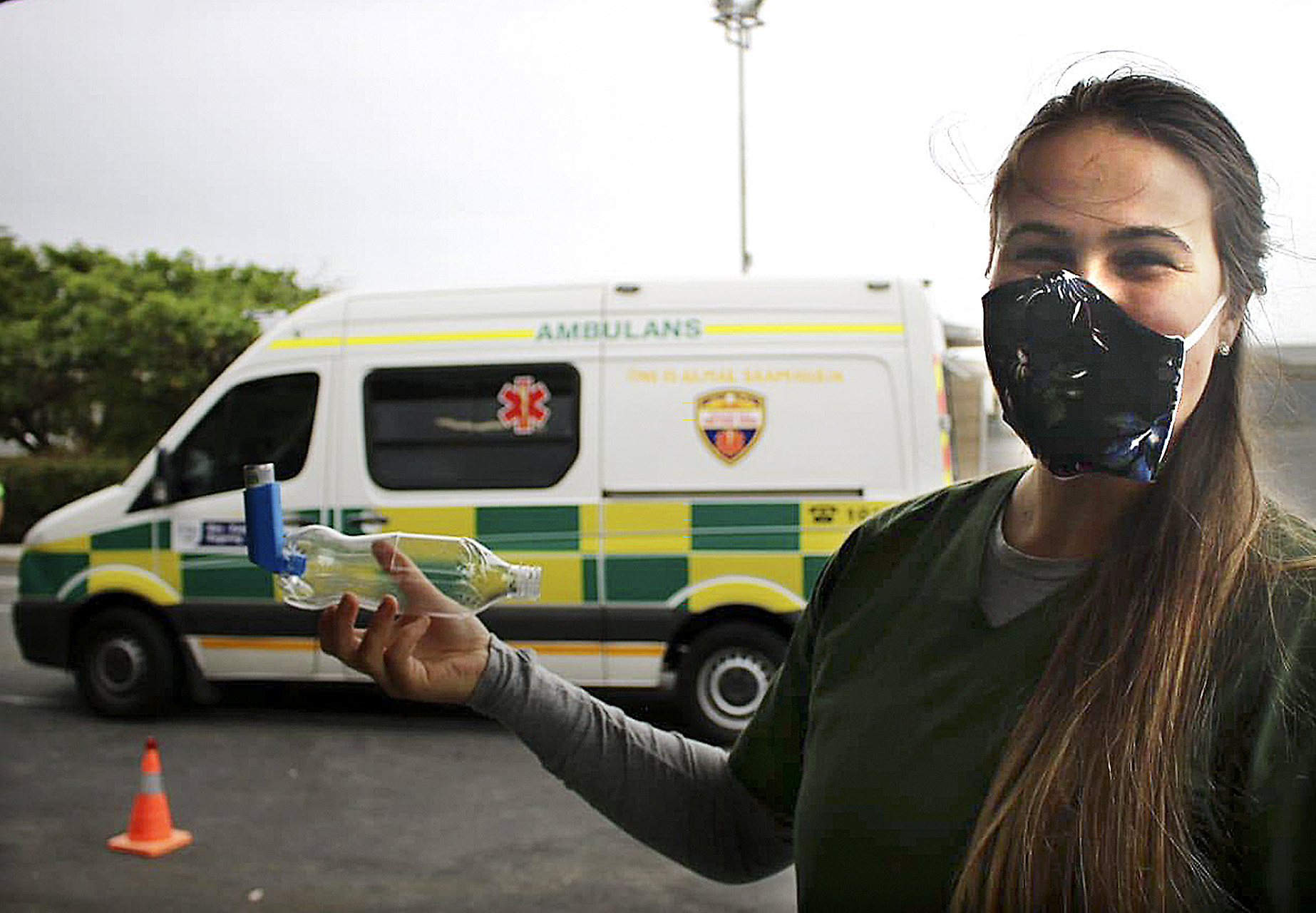
Luné Smith, the co-ordinator of We Fight Back Covid, holds a spacer made by the volunteer initiative. The spacers were made by volunteers and donated to the Pinelands Emergency Medical Services base on 20 April 2020. ( Photo: Sokwanda Njeza.)
The volunteer effort by University of Cape Town Health Science students began in a similar way.
Professor Lee Wallis, the head of Emergency Medicine at the University of Cape Town and for the Western Cape government, was part of the team which set up the Covid helpline at the Disaster Management Centre at Tygerberg Hospital. They needed volunteers to man the phones, so he asked the university’s Surgical Society if they had willing volunteers.
Soon, students from other societies on the medical campus became involved and now more than 100 student volunteers are taking the 12-hour shifts. They range from first- to sixth-year students and are from a range of disciplines within the faculty. They are trained to take a medical history over the phone, assess the caller’s risk and refer them to the appropriate level of care for further help. They do this for 12 hours most days of the week.
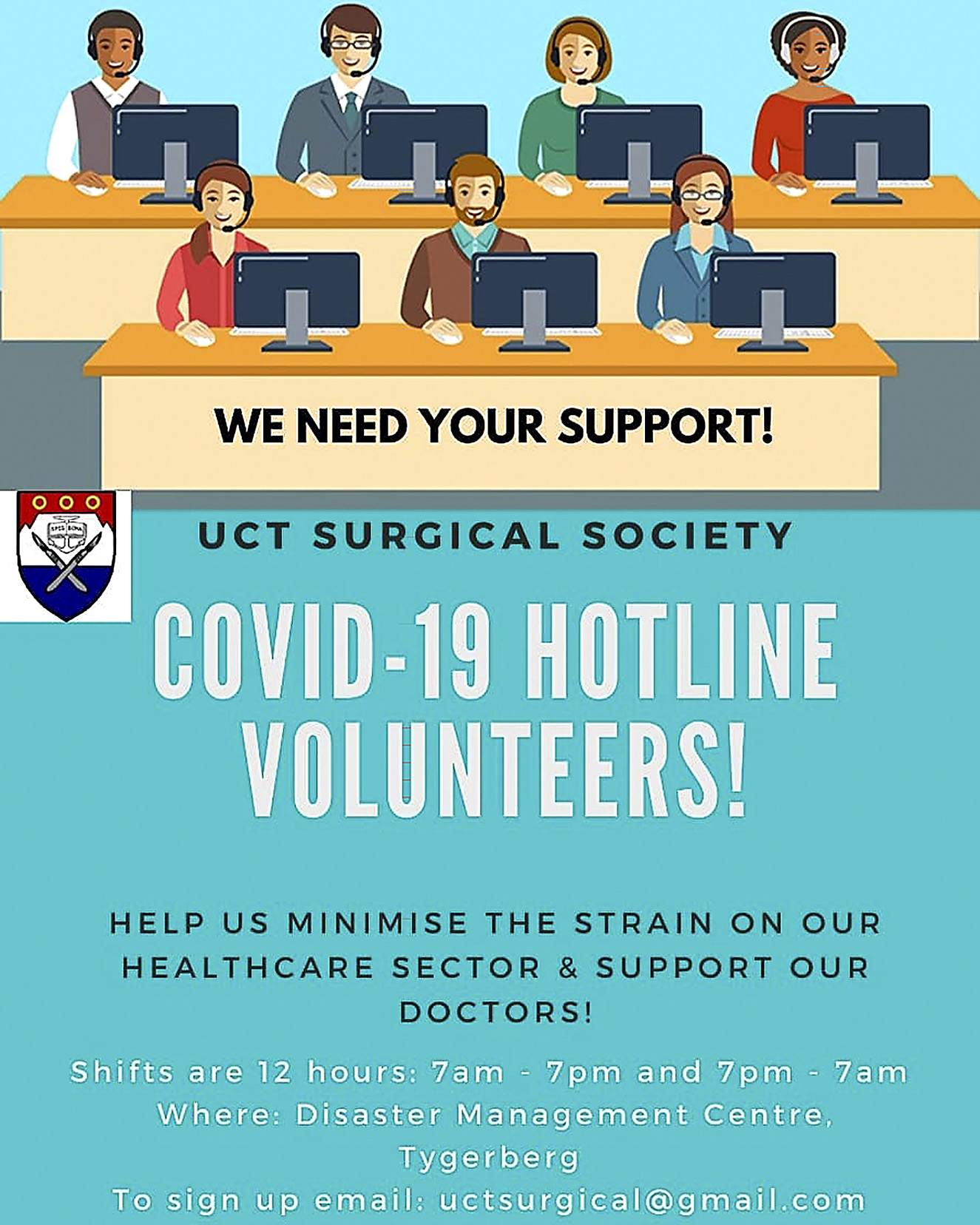
A poster asking students to volunteer to answer the phones at the Covid-19 hotline based at Tygerberg Hospital. The hotline receives hundreds of calls a day. (Photo: Katie Pye)
Like We Fight Back Covid, the project receives guidance and some resources from the university and hospital, but for now it is a purely student-driven initiative, according to the president of the UCT Surgical Society, Savannah Verhage. Echoing Smith, Verhage has seen that students from various disciplines from all universities in the city are asking to join their project.
Professor Wallis describes the students from both universities as:
“Dedicated. Enthusiastic. Committed. Energetic. Smart. Engaged. Pick any other similar adjectives. Honestly, it’s a real pleasure.”
For the medical students Maverick Citizen spoke to, their experience so far has been eye-opening, inspiring and a big reality check.
The stress of the pandemic is getting to the students, observes Smith.
They are just as enthusiastic as before, but they realise their personal lives will also be affected by the outbreak – studies continue regardless, and they are locked down, too. For her, the experience has exposed how it “actually feels” to work in medicine under such pressure and uncertainty.
“Above all else, it’s the fact that the reality hits you and you get so much more appreciation for the staff that have been doing it this whole time. It’s hard… it’s really hard,” she says.
For Abrahams-Crocker, volunteering “has been the most rewarding yet challenging experience to date in my medical career. It has shown me how quickly things can change and the importance of teamwork during a global pandemic. You can be comfortable with the various protocols one day, only to arrive the next day to find it has changed because in these times, we have to be flexible and adaptive to the changes in information and protocols.”
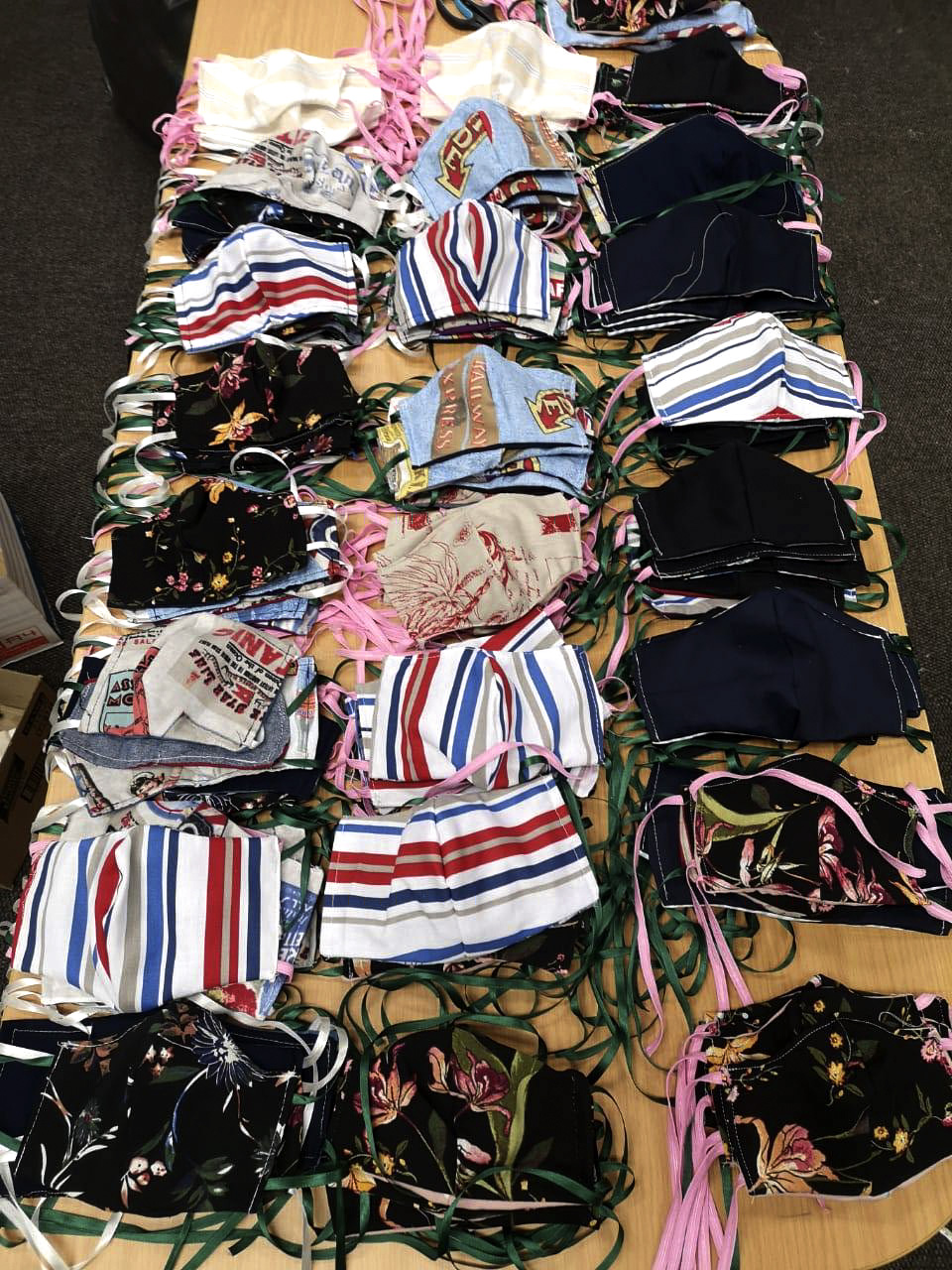
Volunteers for We Fight Back Covid sort 125 cloth masks before they are distributed around Cape Town. The initiative has been making cloth masks since the beginning of April 2020. (Photo: Luné Smith)
“It has been a truly surreal experience, particularly because no one ever expects to be involved in a pandemic of this magnitude during his or her own lifetime,” says Verhage. “However, a crisis like this serves to remind us of just how vital proper preparation and early intervention is if the crisis is to be averted.”
It has been a lesson in itself just to work with EMS and Disaster Management staff and observe how they adapted their teams to safely help suspected Covid-19 patients, says final-year UCT medical student Cathryn McDougall. She has also spent time manning the hotline and has heard a range of requests, from pleas for food parcels to inquiries about testing, to someone calling in to ask:
“I just heard my neighbour coughing: please can you come test him?”
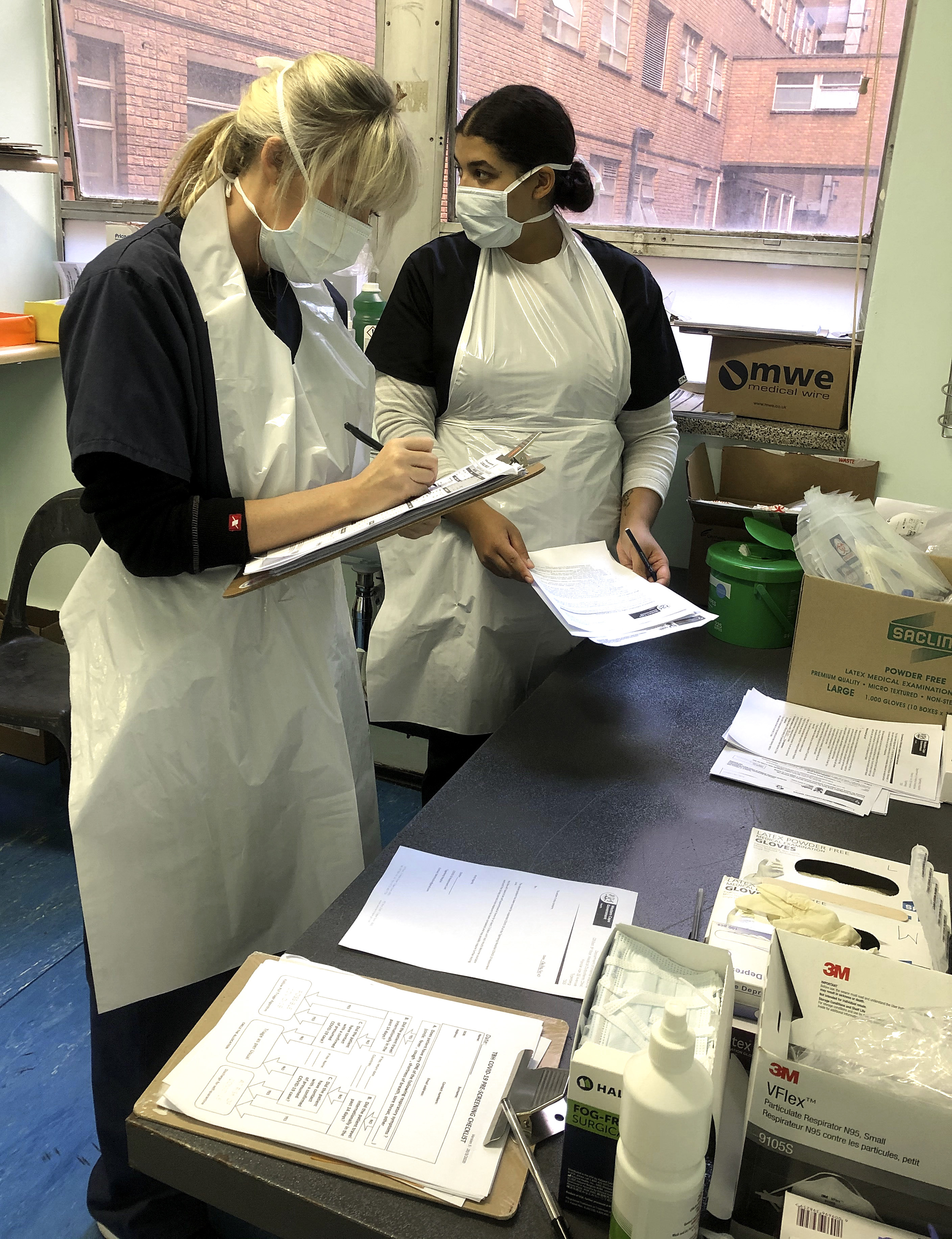
Kyra van Gein, left, and Hannah Abrahams-Crocker, right, fill out paperwork at the Tygerberg Screening and Testing Centre. Both are volunteers for the student-run initiative We Fight Back Covid. (Photo: Rhiyaan Smith)
Working at the call centre and being a point of direct care for people in the Western Cape is very rewarding, says second-year medical student Rene Zinn.
“We are able to influence the health behaviour of communities, guide people through the lockdown and of course help those who are experiencing symptoms such that they receive the best medical care possible. I have had many a phone call end in an expression of gratitude for the round-the-clock service accessible to them via the Tygerberg hotline.”
Being part of these teams has increased the respect and appreciation they have for those working at hospitals, the students say.
“The doctors, nurses, clerks, cleaners, porters, student volunteers and security working at the centre are all amazing people who have made huge sacrifices to serve their county and I could not be happier to work with them,” says Abrahams-Crocker.
“It gives me immense hope for my future in the healthcare profession to know these people will soon be my colleagues… I have never been more sure that I wanted to be a doctor, and I cannot wait to serve my fellow South Africans in whatever way they need me.”
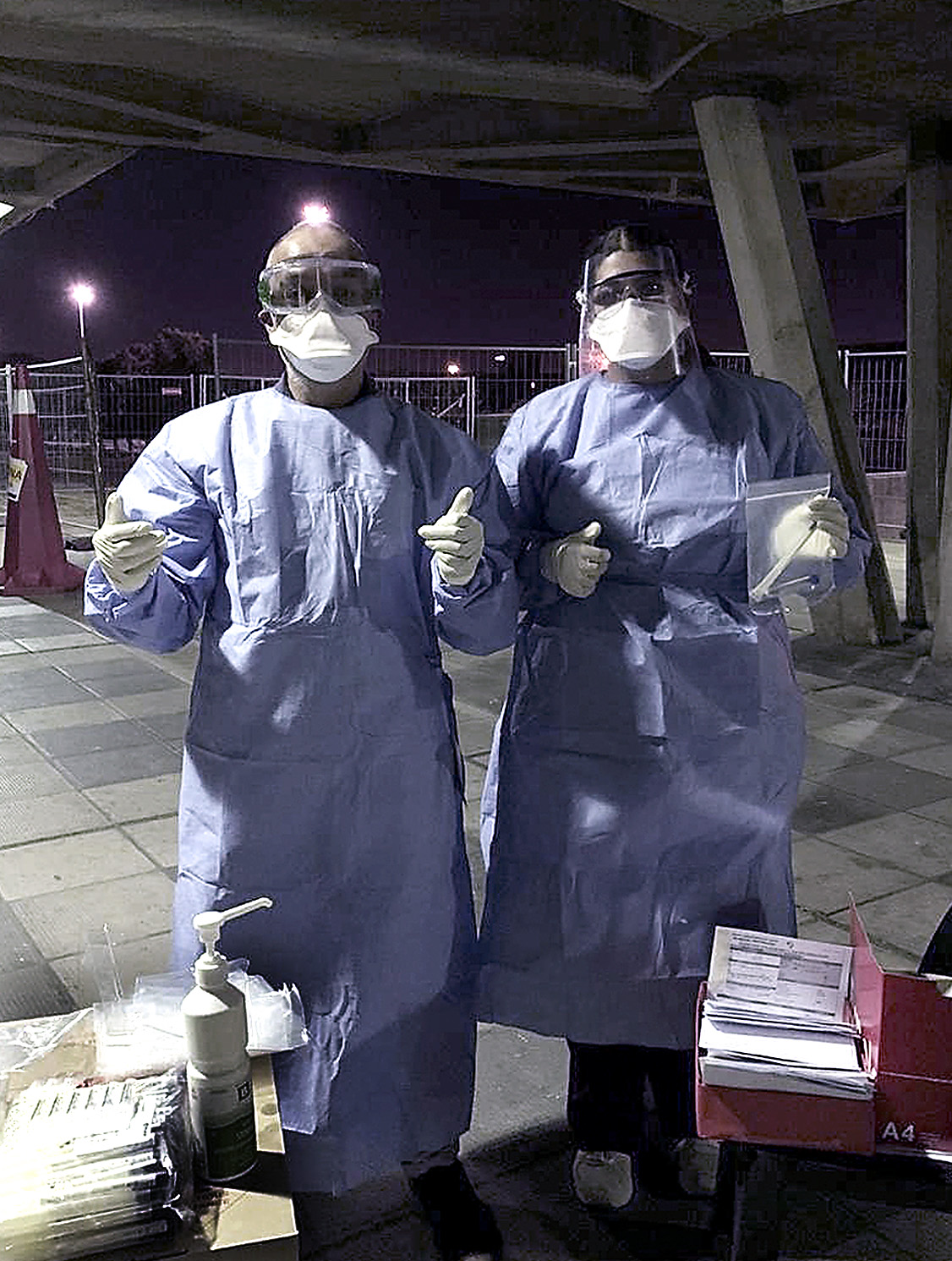
Hannah Abrahams-Crocker, right, with Internal Medicine consultant Dr Abu Mowlana, one of the head doctors at the Tygerberg Screening and Testing Centre, left. Abrahams-Crocker is a volunteer for We Fight Back Covid. (Photo: Rhiyaan Smith)
Being only in her second year of studies, UCT medical student Sabriyyah Ebrahim says she has never been exposed to a mass medical emergency or experienced a night shift before volunteering to answer the hotline.
“It increased the immense respect I have for doctors, nurses and medical students who do this regularly and work in more stressful environments. Answering the phone and listening to South Africans from all over the Western Cape, I could tell that there was definitely a deeply rooted sense of fear and a premonition of imminent disaster in their voices,” said Ebrahim.
“Everyone is worried and I realised it was up to us, the volunteers manning the telephone, to calm them down as best as possible and to show them that they’re not alone and that their fears are valid, but they don’t need to worry themselves further… This experience has definitely taught me that in a moment of crisis, like our country is facing now, kindness, love, patience and perseverance will hold us all together while we’re apart.” DM/MC
"Information pertaining to Covid-19, vaccines, how to control the spread of the virus and potential treatments is ever-changing. Under the South African Disaster Management Act Regulation 11(5)(c) it is prohibited to publish information through any medium with the intention to deceive people on government measures to address COVID-19. We are therefore disabling the comment section on this article in order to protect both the commenting member and ourselves from potential liability. Should you have additional information that you think we should know, please email [email protected]"




 Become an Insider
Become an Insider